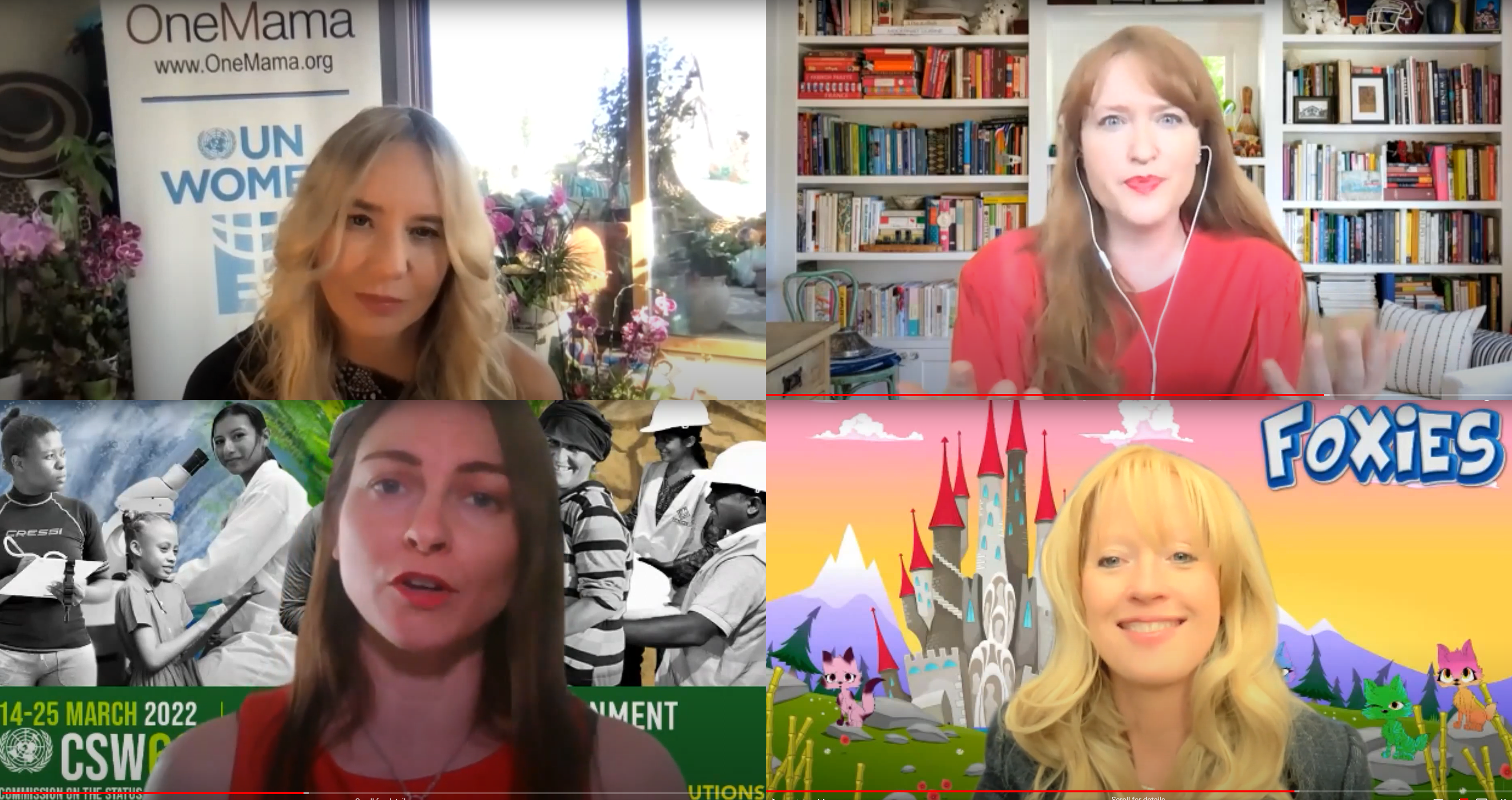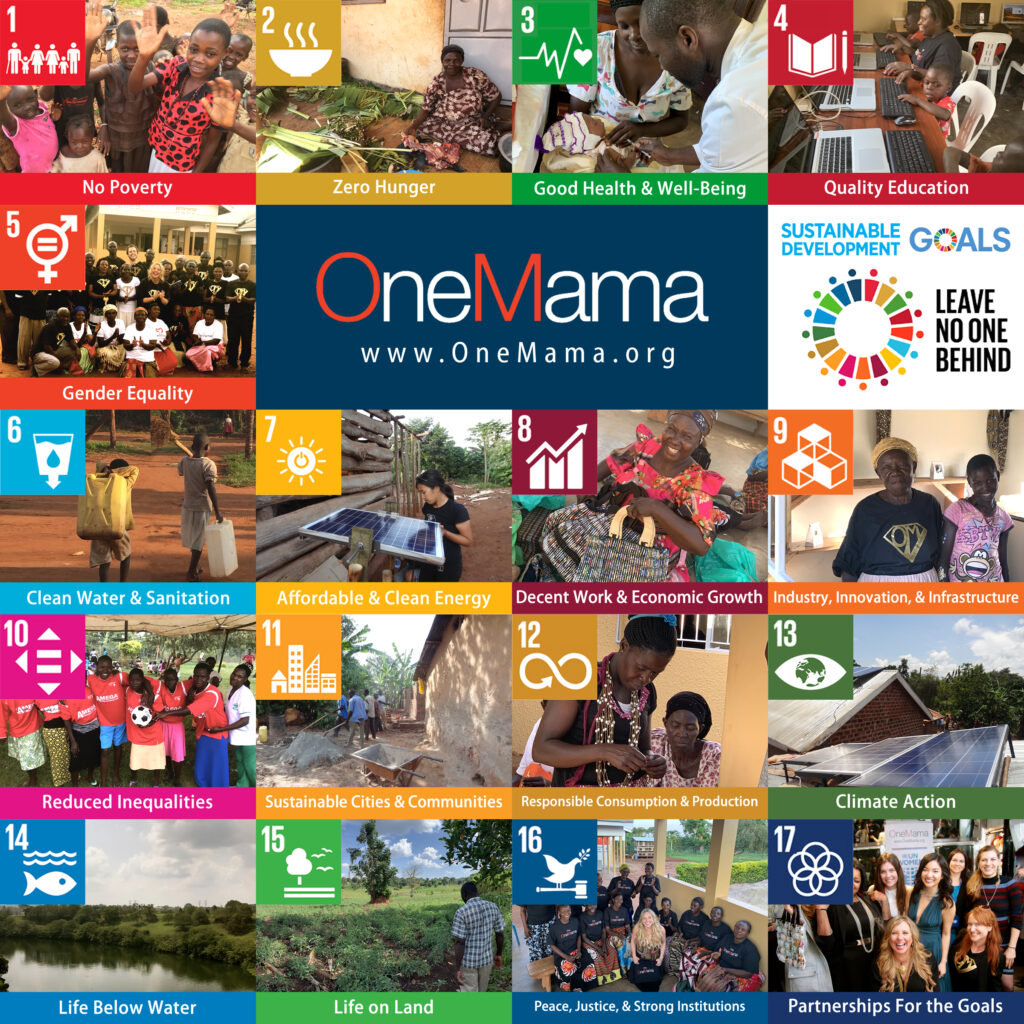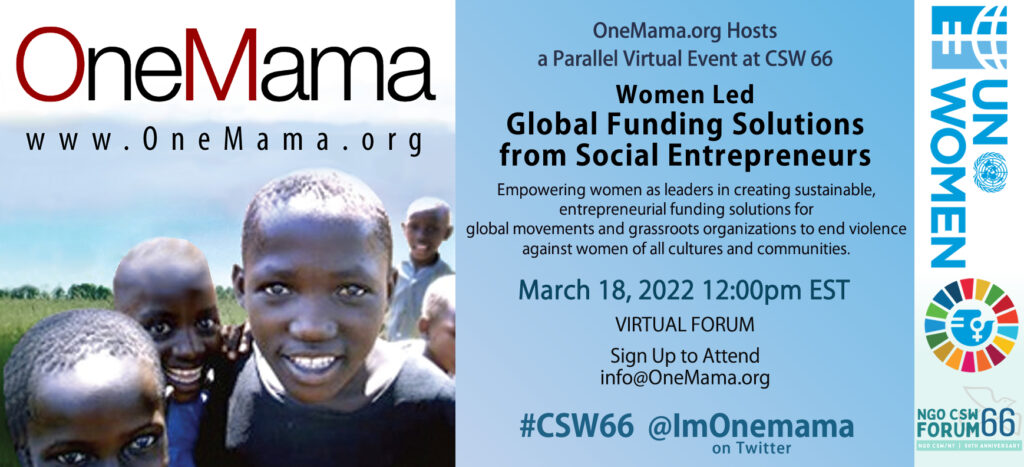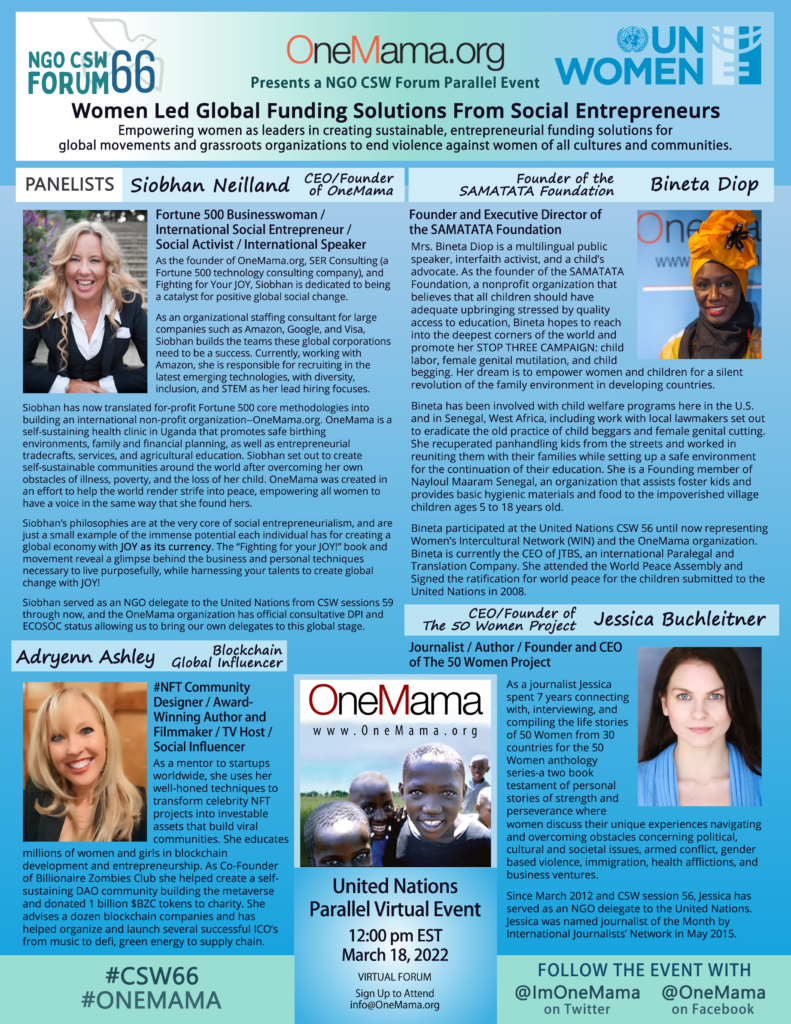NGO OneMama at United Nations CSW 66 2022

NGO OneMama and Delegates Attend the 50th Anniversary and 66th Session on the Commission on the Status of Women Virtually
As an ECOSOC-accredited non-governmental organization (NGO), we are honored to be able to bring a voice for the OneMama village to the United Nations CSW66 world stage…virtually!
The OneMama delegates and family are optimistic through the ups and downs surrounding the past few years of unprecedented times that are causing great strain on the work OneMama does, as it has for many NGOs. We are excited to ride the motivation leading up to the CSW in order to continue our work towards lasting change on a global scale and in conformity with the 2022 CSW themes.
THANK YOU to all who attended and helped make this event a great community success!
You can find our event page HERE for all the details. We were able to capture the event live and you can find that HERE and below:
What is the CSW66?
This year, the 66th session of the United Nations Commission on the Status of Women (CSW66), the UN’s largest annual gathering on gender equality and women’s empowerment, will take place from 14 to 25 of March, under the following themes:
- Priority theme: Achieving gender equality and the empowerment of all women and girls in the context of climate change, environmental and disaster risk reduction policies and programmes;
- Review theme: Women’s economic empowerment in the changing world of work (agreed conclusions of the sixty-first session);
Since last year’s session was strictly virtual due to the coronavirus pandemic, this year’s session will be a hybrid version with main sessions on the UN campus in New York City and all side and parallel events held virtually.
More Resources:
UN released data shows that progress to achieve gender equality in public life and decision-making has been too slow.
- Women make up 25 per cent of parliamentarians globally, and only three countries have 50 per cent or more women in parliament.
- Less than one per cent of parliamentarians are women under 30 years of age.
- Women make up only 13 per cent of negotiators, 6 per cent of mediators and 6 per cent of signatories in formal peace processes.
- In 2020, only 7.4 per cent of Fortune 500 companies were run by women.
- Just 22 countries in the world are headed by a woman.
At the current rate of progress, it will take another 130 years to reach gender equality at the highest positions of power.
The COVID-19 pandemic has impacted women disproportionately – from loss of jobs to rise in violence against women and unpaid care work. Although women are at the front line of COVID-19 response as healthcare workers, innovators and leaders, their contributions remain less visible and less valued. Only 3.5 per cent of COVID-19 task forces across 87 countries had gender parity.
So, what happens when women lead? Evidence shows that when women are in power, they invest in often-overlooked policy measures – from expanding healthcare and education to green economies and ending violence against women – that ultimately build sustainable and resilient futures.
Building back better from COVID-19 needs women at the centre, leading, making decisions that serve the planet, address inequalities, and achieve equal power-sharing.
Achieving gender equality in leadership and decision-making is possible. Gender quotas in legislatures and other sectors, zero tolerance to violence, special measures that enable women to enter the political pipeline, and dedicated funding to women’s organizations, have proven to be catalytic in bringing change.

OneMama’s Work During the COVID-19 Pandemic
The global COVID-19 pandemic presented unprecedented challenges to the advancement and security of women. Its impact on rural communities worldwide proved particularly devastating with women trapped in domestic violence situations, limited access to medical care, and a veritable collapse of economic opportunities.
Building an inclusive and effective path for the sustainable and resilient recovery from the pandemic while honoring the 2030 Agenda and principle of “ensuring that no one is left behind” at the global, regional and national levels is crucial.
As an NGO supporting the rural community of Kirindi in Uganda (East Africa), OneMama is an emblematic case study of the challenges the COVID-19 pandemic both exacerbated and enhanced for rural communities and their women globally. OneMama Inc. promotes sustainable development, maternal health, and community health in a rural model and advocates for sustainable and resilient recovery through our unique programming. We advocate for building an inclusive and effective path for the achievement of the 2030 Agenda particularly around the SDGs that closely align with our program and work: Goal 1 (No Poverty), Goal 3 (Good Health and Wellbeing), Goal 5 (Gender Equality), Goal 8 (Decent Work and Economic Growth), and Goal 11 (Sustainable Cities and Communities). Sustainable development will not holistically happen until rural women and their communities are considered.
In rural areas in Uganda, particularly that of Kirindi, COVID-19 restrictions on transportation (motorcycle and buses) have made it extremely difficult for women to get to our health clinic without walking long distances while pregnant or suffering from illnesses. COVID-19 restrictions also put a halt on all community meetings, craft and OneMama collection women’s group meetings, including our ability to offer limited domestic violence prevention trainings.
Sales of agricultural crops in physical market places shrunk drastically due to contact restrictions and transportation cuts. All these restrictions are also making it hard to get medical supplies like our birth control and medications. Simple home COVID-19 tests have been impossible to access so we can’t track it in our community. The vaccines that have been made recently will most likely never reach our community and if they do they also may not keep since we don’t have the kind of refrigeration needed to protect the vaccine. Domestic violence has increased significantly with the lock downs, giving the women no alternatives to flee or free themselves.
We recommend the following actions to ensure rural women in all global communities are not left behind as developed parts of the world rise from the pandemic more rapidly:
- Tracking health issues we suspect to be COVID-19 due to absence of testing and official tracking. We are watching and communicating daily with our patients and community and increasing medical supplies for both the birthing and medical clinic.
- Obtaining and administering COVID-19 vaccines to all staff and high risk community members.
- Hosting community education days on COVID-19, birthing, family planning, best practices in self-care and domestic violence prevention.
- Searching for funding and partnerships as international restrictions halted 75% of funding.
A partner to provide COVID-19 testing and a vaccine that is distributable in rural areas without refrigeration access.
Click Here to read the Full Statement by OneMama.

How Can You Get Involved?
To donate to OneMama’s programs, click here.
If you are interested to be a OneMama UN Delegate, click here.
Interested in hearing about our past trips to the CSW? Recaps from past years:
CSW65 2021
CSW64 2020
CSW63 2019
CSW62 2018
CSW61 2017
CSW60 2016
CSW59 2015



